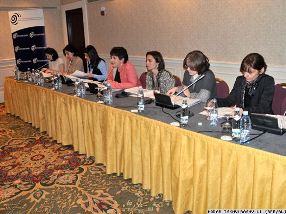Nino Kharadze, Radio Liberty
Seven NGOs evaluated the fulfillment of Georgia’s obligations undertaken in the frameworks of European Neighborhood Policy during the year of 2010.
The so-called alternative report reflecting the outcomes of this research was presented by the Open Society Georgia Foundation on March 15. The corresponding organization was the originator of the research “European Neighborhood Policy: the fulfillment of EU-Georgia Action Plan.”
How independent is media, how well the constitutional amendment comply with the obligations undertaken under the frameworks of EU neighborhood policy and what steps are taken in order to improve the election environment, also how the economic sector reform is being implemented – the representatives of various international organizations, foreign ambassadors in Georgia and other interested individuals heard the report prepared by the NGOs on these and other important matters.
Hereby, it should be mentioned that Georgia undertook responsibility to fulfill the obligations envisaged by the Action Plan of European Neighborhood Policy in order to ensure the western development in 2006. In the frameworks of these obligations several reforms were planned, the implementation of which was observed not only by the organizations existent in Georgia, but European structures as well.
On March 4th, the State Minister for Georgia’s Integration into European and Euro-Atlantic Structures Giorgi Baramidze presented the official report on the fulfillment of obligations undertaken in the frameworks of EU neighborhood policy. It was said then that these obligations are being fulfilled successfully.
The alternative report presented by the NGOs does not agree with opinion. According to the director of Open Society Georgia Foundation, Keti Khutsishvili, there were reforms carried out in 2010, but not many served the democratization. “The year of 2010 was rather eventful, at the same time, it can be said that it was the most stable year compared to the past years starting from 2007. It was possible to carry out reforms. When we are evaluating the general tendency, we should also say that serious progress was made in terms of modernization, however, not of democratization.”
The first issue that the report raises is the constitutional amendments and the distribution of powers among the governmental branches. The head of Georgian Young Lawyers Association Tamar Chugoshvili spoke about this issue: “The main thing that should have been changed is the strengthening the role of Parliament. However, in our opinion, the existent version adopted by the Commission and later by the Parliament, does not ensure the strengthening of Parliament’s role and the restoration of balance between the governmental branches. There are the Constitutionalists who think that the Parliament’s role and significance has rather worsened.”
Tamar Chugoshvili also touched the issue of the independence of judiciary and noted that the independent decision-making by the judges still remains to be a problem and often the High Council of Justice influences them.
Media expert Nino Danelia positively evaluated the legislative amendments planned in the sphere of media, including the fact that the discussions on the Amendments to the Law on Broadcasting have been started in Parliament. Nino Danelia touched the transparency of media owners and the issues of state interference in the media market. However, according to her, the work of National Regulating Commission of Communications still remains to be problematic: “It does not control the compliance to the Ethics Code of Broadcasters which falls under its direct obligation. The same owners own shares of different broadcasters. This creates a serious danger of monopolization of media owners that is correspondingly reflected in the content.”
Despite the implemented reform, still it is not possible to create equal conditions for the participants of election process, states the report. The head of NGO Fair Elections Eka Siradze-Delone notes that during the local elections the facts of use of administrative resources by the governing party was apparent.
After hearing the report, French Ambassador in Georgia Eric Furnie requested a word and stated: “After hearing you, I fell into total depression. So, as it seems like the attempts of EU have been vain and useless. No progress is made in the direction of European values. No free media exists, complete distrust towards Professional Unions, no progress in economics… This is catastrophe. After hearing you, I got a feeling that new Bolshevik state was described to me.”
According to the responses of NGOs, their goal is revealing shortcomings.
The head of EU representation in Georgia, an ambassador Philip Dimitrov attended the meeting. We asked him to evaluate the compliance of Georgia’s current reforms to the tasks of European Neighborhood Policy.
“According to this conclusion, the progress is made in certain spheres, particularly the draft laws that are not adopted yet, such as the amendments regarding the disclosure of media owners and the transparency of means of mass communications. Georgia is working on the Association Agreement that means we will thoroughly study your work. There are many requests here that need to be answered. I assure you that the number of requests will increase,” – stated the EU ambassador to Georgia Philip Dimitrov. He also noted that the European institutions are also working on the reports in this direction that will give an opportunity to see the whole picture.
News
May 15, 2024
Davit Katsarava Severely Beaten by Police Officers
Popular
May 15, 2024
Davit Katsarava Severely Beaten by Police Officers
Articles
February 13, 2024




